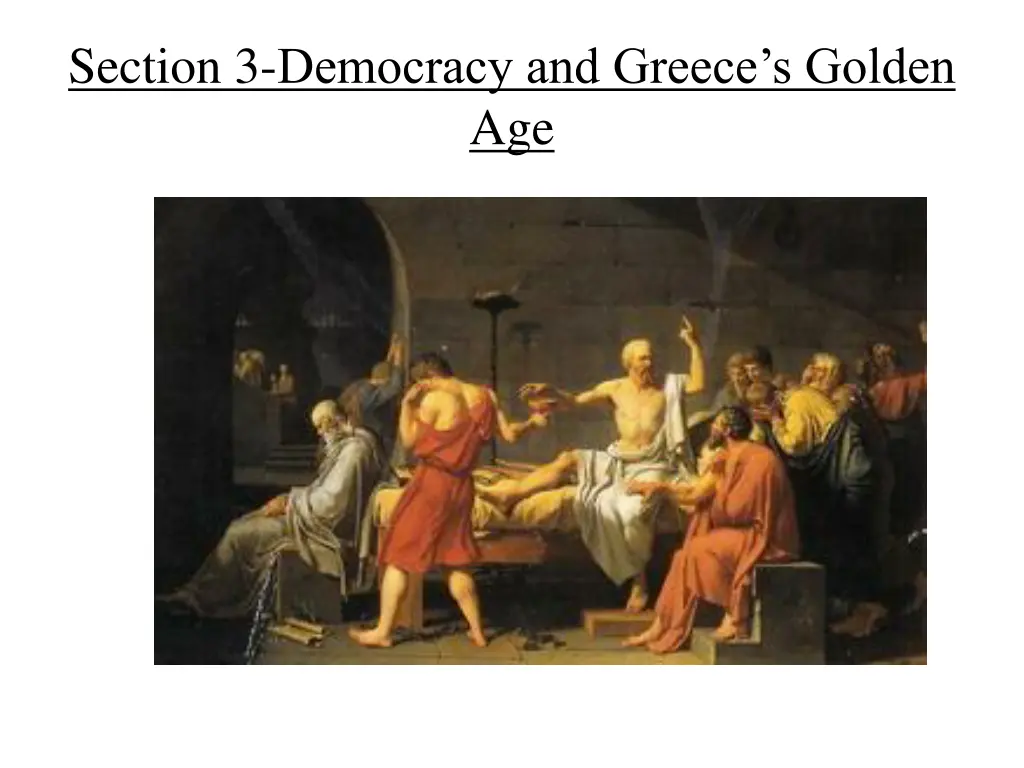
Greece's Golden Age: Pericles' Vision and Achievements
Explore the Golden Age of Athens under Pericles' leadership (477-431 B.C.) marked by intellectual, artistic growth, and the strengthening of democracy. Pericles' goals for Athens, including enhancing democracy, expanding the empire, and glorifying the city through architectural marvels like the Parthenon, are highlighted. Discover the rich culture of ancient Greece, from classical art and sculpture to the invention of drama as a source of civic pride and tribute to the gods.
Uploaded on | 1 Views
Download Presentation

Please find below an Image/Link to download the presentation.
The content on the website is provided AS IS for your information and personal use only. It may not be sold, licensed, or shared on other websites without obtaining consent from the author. If you encounter any issues during the download, it is possible that the publisher has removed the file from their server.
You are allowed to download the files provided on this website for personal or commercial use, subject to the condition that they are used lawfully. All files are the property of their respective owners.
The content on the website is provided AS IS for your information and personal use only. It may not be sold, licensed, or shared on other websites without obtaining consent from the author.
E N D
Presentation Transcript
Pericles Plan for Athens The Golden Age of Athens- A 50 year period (477 to 431 B.C.) where Athens experienced both intellectual and artistic growth.
Pericles Plan for Athens Pericles lead Athens for 32 years He was described as honest, fair, an inspiring speaker, a skillful politician and a respected general. 461 to 429 called the Age of Pericles
Pericles Plan for Athens Pericles' Three Goals for Athens- Strengthen Athens Democracy Hold and strengthen the empire Glorify Athens Direct Democracy-A form of government in which citizens ruled directly and not through representatives.
Pericles Plan for Athens Stronger Democracy- Political office became a paid position Now any one rich or poor could serve if elected or chosen Direct Democracy became one of Pericles lasting legacies
Pericles Plan for Athens Glorifying Athens- Pericles used treasury funds to beautify Athens More money was spent on the artists than the actual materials
Glorious Art and Architecture The Parthenon- 23,000 sq. ft. building created to honor Athena (Goddess of Wisdom) Contained a 30 foot tall statue of Athena
Glorious Art and Architecture Greek Sculptures- Designed to show the idealized human body in motion Both graceful and strong Classical Art- Values harmony, order, balance and proportion
Drama and History The Greeks invented drama Source of civic pride and tribute to the gods Wealthy citizens funded the plays Actors used colorful masks and costumes Plays were about leadership, justice, and duty towards the gods
Drama and History Two Types of Greek Drama- Tragedy-A form of drama containing common themes such as love, hate, war and betrayal. Often featured a tragic hero Someone with an extraordinary ability but a tragic flaw
Drama and History Comedy-A form of drama that contained scenes filled with slapstick situations and crude humor Made fun of politics and respected people or ideas
Drama and History Historical Records- 400 year period with no written history known as the Dorian age Herodotus book on the Persian war is considered the 1st historical work
Athens and Sparta go to War Athens wealth and prestige were the envy of other cities Athens and Sparta quickly became enemies and began to build up their armies Sparta declared war in 431 B.C.
Athens and Sparta go to War The Peloponnesian War- Athens had a stronger navy Spartans had a stronger army They swept in and burned Athens food supply 430 B.C. a plague killed 1/3 of all Athenians 421 B.C. Both sides had became worn down and called a truce
Athens and Sparta go to War Spartans Gain Victory- The truce was short lived 415 B.C. 20,000 Athenian soldiers attacked the city- state of Syracuse The Spartans attacked the Athenians and they fought for 9 more years 404 B.C. Athens surrendered losing their empire, wealth and prestige
Philosophers Search for Truth Philosophers- Lovers of Wisdom based their philosophy on two principals The universe (land, sky, and sea) is put together in an orderly way, thus subject to absolute and unchanging laws People can understand these laws through logic and reason
Philosophers Search for Truth Socrates (470-399 B.C.)- Encouraged his students to examine their beliefs Believed absolute standards did exist for truth and justice Sentenced to death for corrupting the youth Instead he died by drinking hemlock, a slow acting poison
Philosophers Search for Truth Plato (427-347 B.C)- Studied under Socrates Wrote The Republic in the 370 s B.C. This focused on his vision of a perfectly governed society. Felt people fell into three groups Farmers and artisans Warriors The Ruling class Philosopher king was the one with the greatest intellect
Philosophers Search for Truth Aristotle (384-322 B.C.)- Plato s pupil Questioned the nature of the world, human belief, knowledge and thought Created guidelines for arguing according to rules and logic His work is the framework for the scientific method Alexander the Great served as his student for 3 years

![❤[READ]❤ Robotic Exploration of the Solar System: Part I: The Golden Age 1957-19](/thumb/21623/read-robotic-exploration-of-the-solar-system-part-i-the-golden-age-1957-19.jpg)




















